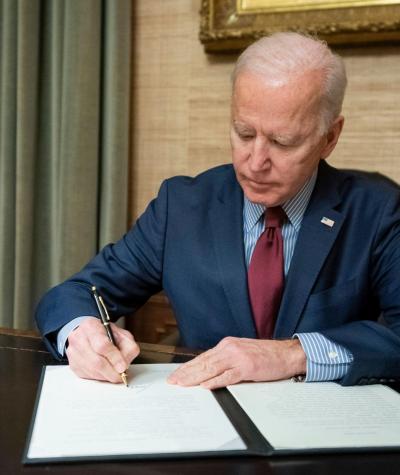On March 7, 2021—the anniversary of Bloody Sunday—President Biden issued an executive order to promote access to voting. This historic executive order recognizes that not all voters in America have equal and accessible pathways to the ballot box.
Certain voters—including voters of color and Native American voters, voters with disabilities, low-income voters, jailed and formerly incarcerated voters, student voters and other historically marginalized constituencies—confront unique and harmful barriers as they seek to exercise their freedom to vote.
To try and change that reality, Biden’s executive order requires that the federal government leverage its power to play a more active role in facilitating access to voter registration and voting, in part by directing each federal agency to develop concrete plans within 200 days about how they will expand citizens’ opportunities to participate in the electoral process.
One-hundred days have since passed. In order to ensure the federal government delivers on the promise of the executive order, CLC has written letters to the White House and federal agencies that are particularly well positioned to support historically marginalized voters.
These agencies include the Departments of Education and Housing and Urban Development (HUD), the General Services Administration (GSA), the Bureau of Prisons, the U.S. Marshals and the Executive Office of U.S. Attorneys.
CLC’s letters advise how these agencies, with best practice recommendations, can promote and facilitate the right to vote as they begin to finalize their plans, consistent with the order’s mandates.
The Department of Education and HUD have untapped potential to improve access to our democracy for chronically underrepresented voters, including college students, low-income people and homeless and underhoused individuals.
The Department of Education can engage with educational institutions and their students to help students register to vote, request a ballot and vote.
HUD, because of its direct connections to programs supporting low-income individuals, people of color, and homeless or underhoused individuals—groups frequently underrepresented among registered voters—can facilitate voter registration drives and get-out-the-vote efforts.
It can work with state and local election officials, civic organizations, religious groups and other nonpartisan, nonprofit organizations that seek to increase voter participation.
HUD can also encourage state and local public housing authorities to make available voter registration forms and vote-by-mail ballot applications in their offices and facilities.
Vote.gov, the federal website providing information to voters, is another federal resource that has lacked investment. It can do more to provide jailed and formerly incarcerated voters crucial information about voter eligibility and rights restoration that would open new pathways to electoral participation.
Specifically, the order directs the GSA, in coordination with the Election Assistance Commission, to modernize Vote.gov. This update has the potential to affect meaningful change.
We have seen firsthand the impact one website can have through our own experience launching and running RestoreYourVote,org, an easy-to-use, accurate and authoritative source on disenfranchisement and rights restoration for individuals previously convicted of felonies that hundreds of thousands of users from across the country have visited.
From its popularity alone, it is clear RestoreYourVote.org has met a real need, but our reach is limited. Thus, CLC not only recommends that the modernized website include tools built on the model of RestoreYourVote.org but has also offered to collaborate with the agencies in making their own website usable and accessible.
Several agencies within the Department of Justice (DOJ) also are uniquely positioned to support jailed and formerly incarcerated voters who seek to participate in our democracy. To that end, CLC also makes recommendations to three arms of the DOJ.
It urges the Bureau of Prisons and the U.S. Marshals to become national leaders in fighting incarceration-based disenfranchisement and show that facilitating elections in prisons can be a routine part of corrections management.
CLC wrote to the Executive Office of U.S. Attorneys encouraging U.S. attorneys to consider a uniform nationwide policy of ensuring that individuals who are prosecuted under federal law receive, at the time of plea negotiation, both written and oral explanations of how their plea affects their right to vote.
Recognizing that this suggestion departs from the traditional role of U.S. attorneys in the adversarial process and goes beyond their constitutional obligations, CLC urged that such a policy nonetheless would go a long way to combatting the widespread and often erroneous belief that a felony conviction means a person can never vote again.
Finally, CLC is advocating for the White House to go further and continue to push for innovative reforms to expand access to our democracy for all voters.
Thus, CLC urged President Biden to issue an executive order requiring that contractors getting new contracts with the federal government give employees paid time off to vote and support employees who wish to volunteer as poll workers or observers.
The federal government spends around $500 billion annually on federal contractors, and the top contractors have millions of employees, so this modest policy change could dramatically expand access for a large group of people.
President Biden’s executive order mobilizes the federal government to protect and extend the right to vote in a broad and robust way. CLC’s suggestions offer a roadmap for how many federal agencies can live up to that mandate and implement the order to better secure access to the freedom to vote for millions of Americans.
The recommendations are just a starting place.
The federal government must seize this historic opportunity to not only leverage its full powers to integrate civic engagement support into the daily operations of all federal agencies, it must also innovate and explore new ways to expand access to the franchise to the Americans that each agency serves.
We hope the administration continues to consult with civil rights groups, impacted constituencies and experts as it finalizes these plans, and we look forward to seeing what new and exciting polices will be adopted 100 days from now.
